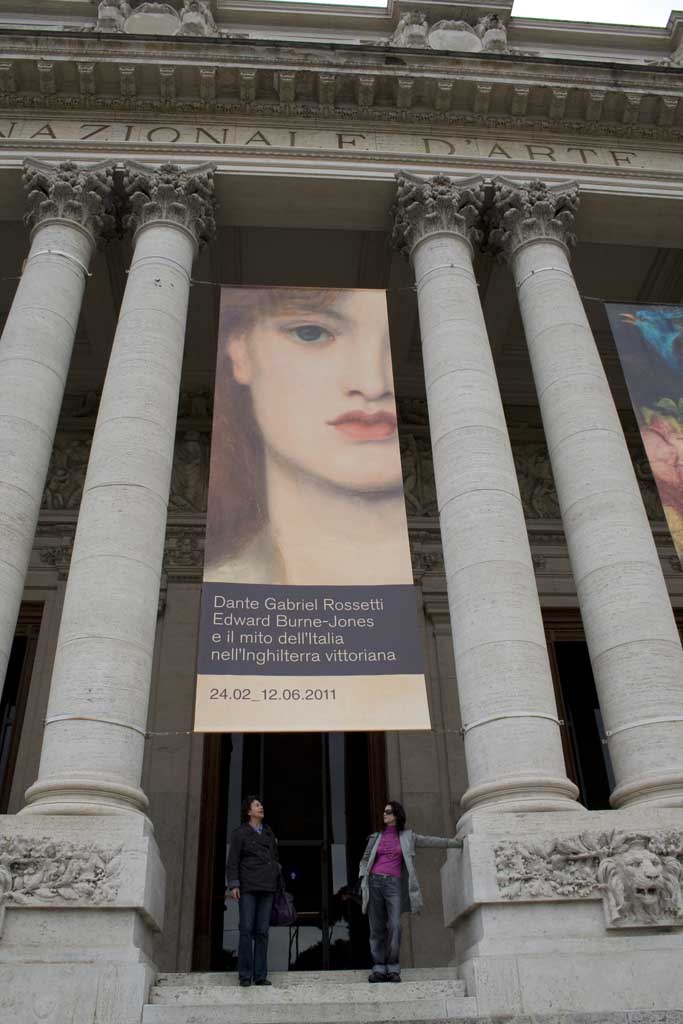PROSERPINING
From Rome's high galleries of modern art this morning I am whisked back to my 20-year-old encounter with the near godlette of spring in a Morgantina cistern, via two images of melancholy Persephone with her condemning pomegranate seed in fugues from the underworld. One of them, by Dante Gabriel Rossetti, is accompanied by an Italian sonnet whose style I cannot identify.
In seeking out information regarding the Italian poem in the upper right-hand corner and its English translation in the frame, which are altogether ignored by the GNAM curators, I scoop from the underworld of virtual info-mation a warning:
"(please note: The meaning of this poem is communicated more effectively if you pause only at the punctuation and not at the end of every line.)" In order to find Christ through "Proserpine," apparently, you must ignore that it is a poem.
And from its host, the Tate, in the place of text or commentary I come upon this map of associations:
| • group/movement |
|
|||||||||
| • nature |
|
| • objects |
|
| • people |
|
| • religion and belief |
|
| • symbols & personifications |
|
|||||||||||||||||||
But thanks to the electronic Rossetti archives various copies and corrections of both Italian and English versions emerge, both lovely:
PROSERPINA.
Lungi la luce che in su questo muro
Mi giunge/Riffrange appena, un breve istante scorta
Del mio palazzo alla lontana porta.
Lungi quei fiori d'Enna, o lido oscuro,
Dal frutto tuo fatal di cui snaturo/che omai m'è duro.
Lungi quel cielo dal tartareo/funereo manto
Che qui mi cuopre: e lungi ahi lungi ahi quanto
Le notti che saran dai dì che furo!
Lungi da me mi sento; e ognor sognando
Cerco e ricerco, e resto ascoltatrice;
E qualche cuore a qualche anima dice,
(Di cui mi giunge il suon di/da quando in quando,
Continuamente insieme sospirando)
Ahimè per te, Proserpina infelice!
PROSERPINE.
Afar away the light that brings cold cheer
Unto this wall, -- one instant and no more
Admitted at my distant palace-door:
Afar the flowers of Enna from this drear
Cold fruit, which, tasted once, must thrall me here:
Afar those skies from this Tartarean grey
That chills me: and afar; how far away,
The nights that shall be from the days that were.
Afar from mine own self I seem, and wing
Strange ways in thought, and listen for a sign:
And still some heart unto some soul doth pine,
(Whose sounds mine inner sense is fain to bring,
Continually together, murmuring,)
"Woe's me for thee, unhappy Proserpine!"
In seeming compensation for her destiny among the darkness, via discursive superabundance, Rossetti wrote not only an Italian sonnet and an English translation of it to accompany his own painting, but ekphrastic description as well:
The figure represents Proserpine as Empress of Hades. After she was conveyed by Pluto to his realm, and became his bride, her mother Ceres importuned Jupiter for her return to earth, and he was prevailed on to consent to this, provided only she had not partaken any of the fruits of Hades. It was found, however, that she had eaten one grain of a pomegranate, and this enchained her to her new empire and destiny. She is represented in a gloomy corridor of her palace, with the fatal fruit in her hand. As she passes, a gleam strikes on the wall behind her from some inlet suddenly opened, and admitting for a moment the light of the upper world; and she glances furtively toward it, immersed in thought. The incense-burner stands behind her as the attribute of a goddess. The ivy-branch in the background (a decorative appendage to the sonnet inscribed on the label) may be taken as a symbol of clinging memory. ( Sharp, Dante Gabriel Rossetti, 236 ).
|
|
||||||||






